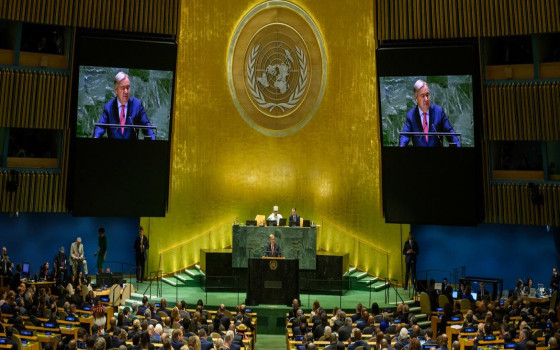
Conflicts, especially in the Middle East, climate change, inequality, and technological risks… Issues that require urgent and coordinated global action

- Europe and Arabs
- Friday , 19 September 2025 9:30 AM GMT
New York: Europe and the Arabs
UN Secretary-General António Guterres said the global crisis of war, climate change, inequality, and technological risks requires urgent, coordinated action. Ahead of the start of the General Assembly's high-level week, he made a powerful appeal to world leaders to change course and cooperate to address shared problems.
In an interview with UN News conducted by Melissa Fleming, Under-Secretary-General for Global Communications, Guterres said: "We are facing a global crisis, with conflicts multiplying in a context where geopolitical divisions do not allow them to be addressed effectively."
He added: "There is a sense of impunity – every country thinks it can do whatever it wants. On the other hand, we see developing countries facing enormous difficulties. Many are deeply in debt and lack access to the concessional financing they need to revive their economies. Inequality is rising."
Global cooperation is indispensable
The Secretary-General highlighted the multiple fronts on which the United Nations is seeking to mobilize global cooperation. He said, "Climate change is not yet under control. We have several indications that it may be difficult to maintain our main goal, which is to keep the rise in global temperature below 1.5 degrees Celsius" compared to the pre-industrial era. The Secretary-General is referring to the limit agreed upon under the 2015 Paris Agreement on Climate Change.
He also warned that technology, while promising opportunities, could exacerbate polarization and hate speech, emphasizing the need for governance in this area to ensure that the will of humanity is preserved and that technology becomes a force for good.
The UN Secretary-General emphasized the need for high-level meetings next week to produce commitments in key areas: reducing greenhouse gas emissions, reforming international finance, and strengthening multilateralism.
He urged leaders to "reverse the curve" and accept reforms to the international financial architecture for greater justice and equality.
Focus on the Middle East
Peace and security will also be a focus of discussions next week. The Secretary-General said he expects clear support for a two-state solution to end the Israeli-Palestinian conflict and immediate measures to address the humanitarian crisis in Gaza.
He said, "The carnage in Gaza must end... We need an immediate ceasefire with the immediate release of all hostages."
He also highlighted the crises in Sudan and elsewhere, calling them "forgotten conflicts," and urged unified action by the Security Council to prevent further suffering.
Climate Action Now
Mr. Guterres emphasized that his commitment to combating climate change through urgent action remains undiminished.
He said that every Member State must present its new climate plan, which delivers significant reductions in emissions, to avoid reaching a point of no return that would lead to a catastrophe of enormous proportions for the people of the world.
Antonio Guterres noted that the most vulnerable countries, including small island developing states and African nations, face disproportionate risks.
On a personal level, Guterres rejected any surrender to despair. "I am neither optimistic nor pessimistic, I am determined... We must build hope and never give up until we achieve our goals," he said.
According to the United Nations Daily News, in a year marked by mounting global turmoil—from expanding wars and economic hardship to the ever-increasing climate crisis—the United Nations has withstood challenges, striving to promote peace, advance sustainable development, and alleviate human suffering.
The Secretary-General's annual report, released Thursday ahead of the annual high-level debates of the UN General Assembly, outlines the organization's efforts to address mounting challenges.
In his report, Secretary-General António Guterres highlighted the resilience of UN staff, who are committed to providing hope and helping those in need despite working under difficult circumstances. "This report shows that despite these extremely challenging times—and indeed precisely because of them—we can and must continue to strive for a better world that we know is within reach," he said.
In collaboration with its partners, the United Nations has coordinated a $50 billion appeal to meet the humanitarian needs of 198 million people. "In 2024, the United Nations contributed $25 billion towards the $50 billion funding target, enabling life-saving humanitarian assistance to reach 116 million people in urgent need in 77 countries and territories."
This enabled the implementation of life-saving programs in the Horn of Africa, the occupied Palestinian territory, Sudan, Ukraine, Yemen, and areas affected by natural disasters such as earthquakes in Vanuatu, drought in southern and eastern Africa, and floods in Southeast Asia.
At the same time, UN operations in 2024 suffered a heavy human toll. It was the deadliest year on record for UN staff and humanitarian workers, with 373 aid workers killed. The vast majority of these victims were staff of the United Nations Relief and Works Agency for Palestine Refugees in the Near East (UNRWA), operating in Gaza under harsh and dangerous conditions.
The Secretary-General paid tribute to their sacrifices during the report's release, reaffirming the United Nations' unwavering commitment to standing with the world's most vulnerable.
In a few days, world leaders will gather at UN Headquarters for a high-level general debate in the iconic General Assembly Hall. Representatives of all 193 UN Member States, as well as two observer delegations, will speak. Concurrently, the UN will host a series of high-level meetings to discuss the most important challenges facing humanity. In light of global crises—from wars and climate change to gender inequality and the challenges of artificial intelligence—this high-level week takes on significance beyond an annual tradition. It represents a crucial opportunity for the international community to reflect, renew commitment, and reshape our common future.
The high-level week of the 80th session of the General Assembly is particularly significant this year as it coincides with the 80th anniversary of the founding of the international organization.












No Comments Found